Giving bugs a good name
A group of friends turn childhood interest in entomology into a passionate career, Li Yingxue reports.

Every child goes through a phase where creepy-crawlies interest them. You could say they get bitten by the bug. But sometimes it turns out to be more than a passing fad. For four Shanghai-based bug enthusiasts, it actually started 16 years ago when they got to know each other through an online forum. Two of them were junior middle school students and two were already in college.
They have been sharing their discoveries, mutually identifying species and sometimes visiting zoos or botanical gardens together to collect specimens ever since.
This long-standing hobby has now turned into a career. The quartet founded their studio, DachengXiaochong, or Mini Beasts, earlier this year, with the aim of observing and recording species diversity in China.
Their first labor of love went public in June-a book named Shanghai Woniu (Snails in Shanghai) that carries data on more than 40 species of gastropods found in and around the city.
The book is written by Zhou Deyao, a graduate with a master's degree in zoology from the College of Life Sciences at Shanghai Normal University, who now works on plant protection at a local agricultural technology extension and service center. It is edited by the other three members, Song Xiaobin, Tang Liang and Yu Zhizhou.
Anyone who has ever wanted to know how many species of snail there are in Shanghai, what they all look like and where you might see them, can find all this in the book-the information for which took Zhou years to compile and research.
The strong point of the pocket-sized publication is the attention to detail. Each species of snail is depicted in four photos, one of its body and three of its shell from different angles.
There are some species listed that were recorded in documents they read, but were not actually spotted and seen by the team in Shanghai, so Zhou hopes the references in the book will serve as clues for readers to go out and find them.
Tang is an associate professor in zoology at Shanghai Normal University, Zhou's alma mater, and a council member of the Shanghai Society for Entomology.
"When I was a kid and played with the bugs alone, I wondered if there was any other child in the world that had the same interest," Tang recalls. "When I was a graduate student, I got to know Zhou and other bug lovers on the internet, and that became the starting point for this book."
Song, 30, also a graduate with a master's degree in zoology from the same university, has been running another studio that aims to popularize science since 2017.
According to him, the Chinese book was created specifically to spark public interest. It is free to anyone who requests a copy, but the recipient has to cover the postage, which is 16 yuan ($2.26).
"We hope materials such as the book can help people in Shanghai to better know and understand the species around them and that it can also provide a reference for the government when making environmental protection policies," he says.
The hunter by all means
Observing and researching bugs in the field is fun for the foursome, especially when they find a species that has never been discovered before. In the past five years, several new species have been found in Shanghai, including a beetle named Eustra shanghaiensis, which was discovered by Song.
The article about finding the new beetle species was published on ZooKeys, a peer-reviewed open access scientific journal covering zoological taxonomy, phylogeny and biogeography in 2018.
"The Eustra shanghaiensis has an average length of 3.12 millimeters, and it likes to hide in rotten wood and eat small arthropods," Song says. "It's small, but it's a bioengineer and biochemical weapon specialist-when it's under attack, it can 'fire' a debilitating chemical at its enemy."
With new species continuously being found, people may think discovery work is easy, but it's not. One discovery may have taken more than a decade of exploration and hard work.
"For me, to finish the essay about this beetle, I've spent 10 whole years accumulating firsthand data and specimens, as well as visiting many green spaces and parks in Shanghai to collect and observe them," says Song, adding that collecting a new bug that he has never seen before is only the first step. He then has to dissect it and make numerous comparisons with known species.
That last part may take years, as materials pertaining to related species around the world have to be found and cross-checked. Sometimes they have to consult with international specialists and museums.
"There is always a high probability that it's already known," Song says. "Some species may have been discovered in nearby provinces, such as Zhejiang and Jiangsu, but if it is just the case that it has not been discovered in Shanghai before, it can still help to fill in the blanks of the species in the city."
For him, finding new species is only a bonus, as he likes to observe all bugs. Each week he will spend two days rummaging through fields and will often return home with around 100 specimens.
"July and August are a golden time," Song says.
He prepares different tools to collect his specimens. If he is searching around a lake, he will bring one type of net, but if he is looking for bugs on tall trees, he has a 10-meter-long homemade stick with a net attached. For unearthing creepy-crawlies underground, he uses a sieve.
He has some other bug-catching hacks, too. "Some bugs can play dead, but when you place an open umbrella upside down under a tree and knock the branches, the 'dead' ones will fall on the umbrella, then you can collect them," Song says.
Attracting companions
Unlike the other three professional biologists, Yu, 38, has always been interested in insects as a hobby. He is a professional jade carving artist and his signature work is, of course, bugs.
"The other three may observe the bugs from a taxonomy angle, but for me, to go outside, find a new bug and learn all I can about it is fun," Yu says, adding that it's also a good outdoor exercise for him, given that he spends many hours of his day hunched over while carving.
Yu says the group used to hunt bugs across China, even the world, but they gradually turned their focus to their hometown.
"The species taxonomy for birds and large animals in Shanghai has been largely done, but not for bugs, and we have been collecting material for more than a decade. It's time for us to flag our findings and contribute more to society," Yu says.
The team set up the studio this year, the Chinese name of which literally means "large city, small bugs". They want to start with Shanghai and then explore biodiversity across China.
"Only if we fully understand the bugs' living conditions can we use scientific ways to protect them," Song says.
He thinks that observing bugs is a good way for children to learn about biodiversity. "There is a misconception that all bugs are dirty or poisonous. Actually most bugs thrive on cleanliness and are not dangerous," he says. He hopes to take more people to natural areas to see the bugs, discover their beauty and help protect them and the environment.
"When I met Tang in 2004, he was a graduate student in zoology, and a decade later, I followed suit, becoming a specialist. Now, when I hold science popularization lectures for young students, I hope I can inspire some of them to devote themselves to entomology like us," Song says.

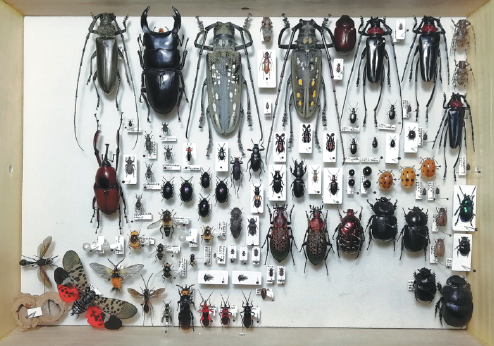
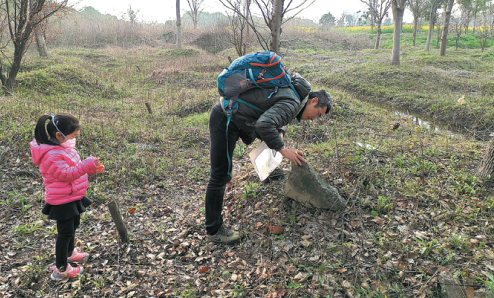
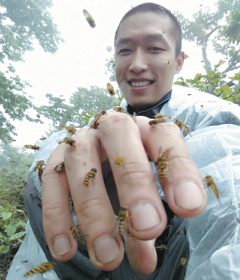
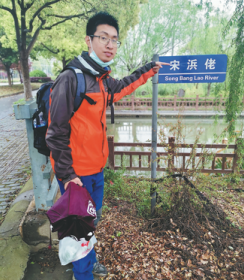
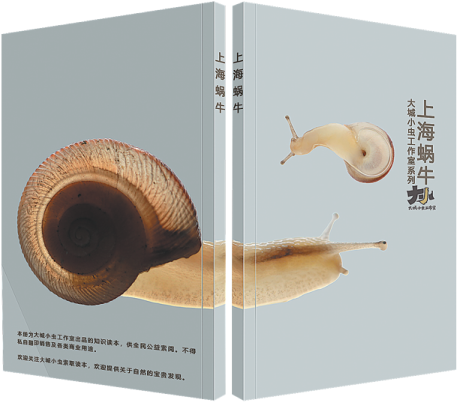
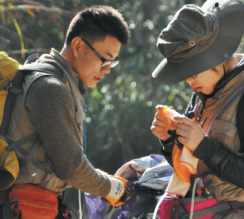
Today's Top News
- Xi chairs CPC leadership meeting on Party conduct, anti-corruption work
- Why Hainan Free Trade Port stands out
- Rule of law strengthens business environment
- Documents affirm one-China principle
- Central SOEs urged to push upgrading
- Agreement boosts ocean governance






























